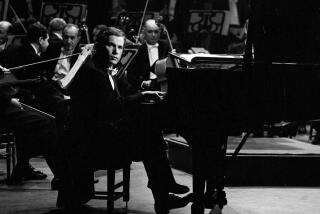Critic’s Notebook: Open your ears to Milton Babbitt
It is easy and commonplace to think of Milton Babbitt, who died on Saturday at 94, as a composer of unfathomable contradictions. He wrote formidable music of unprecedented structural complexity yet had a background in jazz and popular music of the ‘20s and ‘30s and an encyclopedic knowledge of Tin Pan Alley songs.
He became known for an essay published in 1958 as “Who Cares if You Listen?” (not his title), yet he cared so much for the listener that he devoted his life to “enhancing” listening, to expanding what the ear could hear and apprehend, and to giving of our most sensitive sense organ an evolutionary shove.
His theoretical writings could be impenetrably thick, yet he was one of music’s great wits and the most wonderful musical raconteur I knew. He gave thorny pieces hilarious titles — “Four Play,” “The Joy of More Sextets,” “Around the Horn,” “Swan Song No. 1.”
He was accused — by critics, performers, audiences — of caring more about form than content, yet one of his most famous students, Stephen Sondheim, once said that the revelation in studying with Babbitt was learning that the way to the heart was through the head. Spend time with Babbitt, and you, too, might find intoxicating pleasure in complexity, be it in 12-tone music (of which he was America’s incomparable master) or beer (of which he was a connoisseur).
But since nothing about Babbitt’s mind, work or being was easy or commonplace, these different sides were not, in fact, contradictions. They were representations of a complete mind, a complete composer, a complete man. Babbitt didn’t oscillate between opposites, he encompassed them.
Yet of all the great American composers, he was and continues to be the hardest sell. He never managed to persuade the vast majority of performers and audiences that caring if they listened as well as caring about musical integrity were possible and necessary.
Babbitt was a proud academic who taught at Princeton (where he knew Einstein), and he approached music as a scientist approaches nature. He made discoveries, advanced knowledge. He was a pioneer in electronic music in the early ‘50s, when that required the use of sophisticated room-sized equipment. He was also a pioneer in producing music that flickered with the speed, intricacy and convolutedness of thought.
When accused of writing music only for the ears and minds of experts, Babbitt was always ready to defend expertise. Where would, say, medicine be without it? One could also add that not football, not hip-hop, nor the stock market is for anyone ignorant of their intricacies.
But the fear of Babbittry has been hard to counter among the public and performers. A quarter-century ago, the Philadelphia Orchestra commissioned a piece for string orchestra from Babbitt, which he titled “Transfigured Notes” (a pun on Schoenberg’s “Transfigured Night”). Riccardo Muti, then music director in Philadelphia, told me that he took the score with him on a ski trip to learn but that a perusal of it was enough to get him to throw his hands up in the air and hit the slopes.
Dennis Russell Davies was brought in to conduct, but the orchestra rebelled after a single run-through in rehearsal, and the performance was canceled. Shortly thereafter, Gunther Schuller premiered and made a credible recording of “Transfigured Notes” with a student orchestra at the New England Conservatory of Music.
Of today’s big-name performers, James Levine alone is a Babbitt champion. Six years ago, during his first season as music director of the Boston Symphony, Levine commissioned Babbitt’s last orchestral work, “Concerti for Orchestra,” a gorgeous piece of gossamer textures, delicately dancing figures and kaleidoscopic colors.
The Boston Symphony audience, reputed to be conservative when it comes to new music, listened intently and gave Babbitt a warm and sustained standing ovation. Levine has had similar successes conducting Babbitt’s works with the Metropolitan Opera Orchestra in Carnegie Hall.
Still, Babbitt died a neglected composer, possibly our greatest and most important neglected composer. That will change; there are eager young players who can and do play any and everything, and the anxiety over complexity is overrated. Babbitt’s last weekend on Earth coincided with a Xenakis Festival at REDCAT, well attended by a diverse crowd, young and old, drawn from the art world, the new music world and the pop music world. Xenakis was more exotic than Babbitt, being Greek, but his music, too, is confoundingly difficult and intriguing for that very reason.
Let Babbitt be the next big thing.
More to Read
The biggest entertainment stories
Get our big stories about Hollywood, film, television, music, arts, culture and more right in your inbox as soon as they publish.
You may occasionally receive promotional content from the Los Angeles Times.







